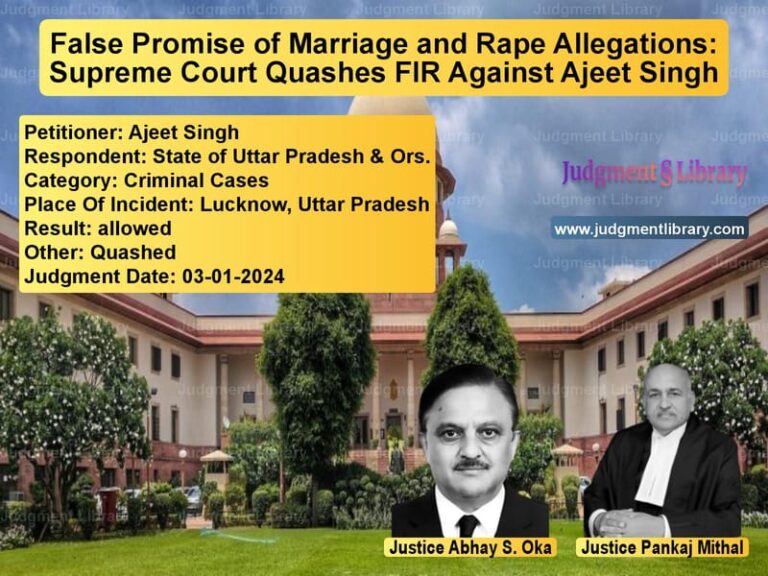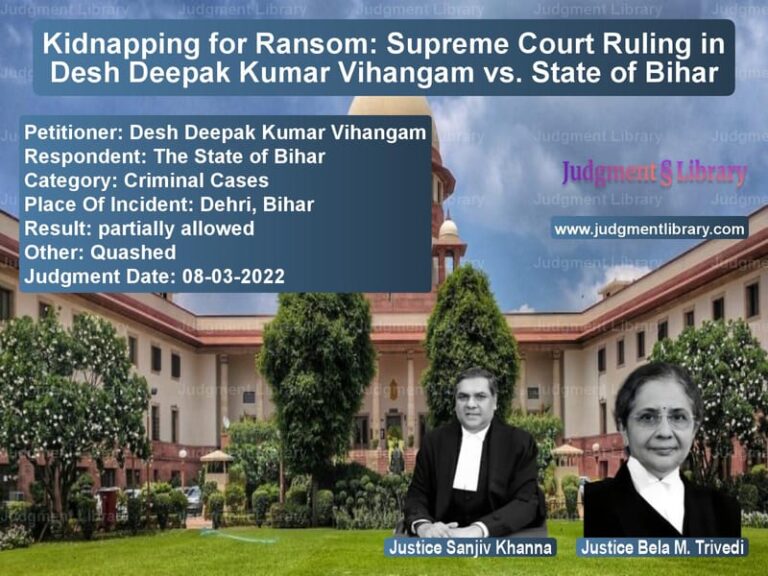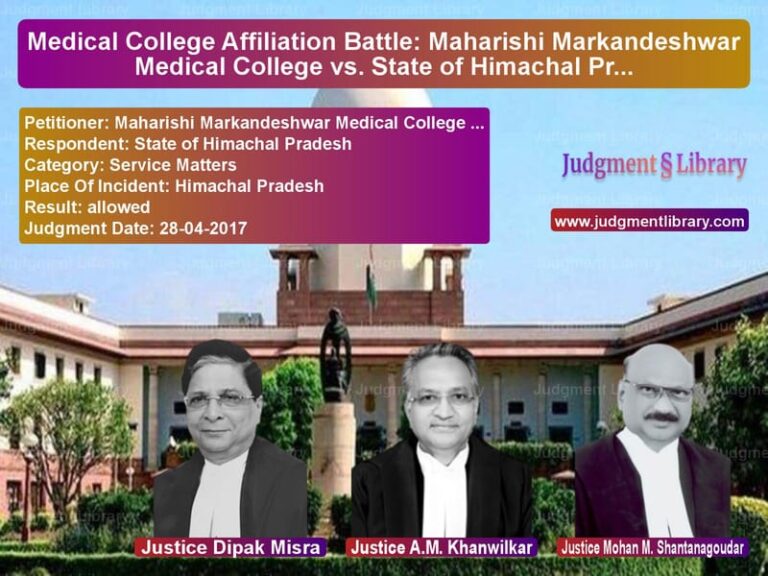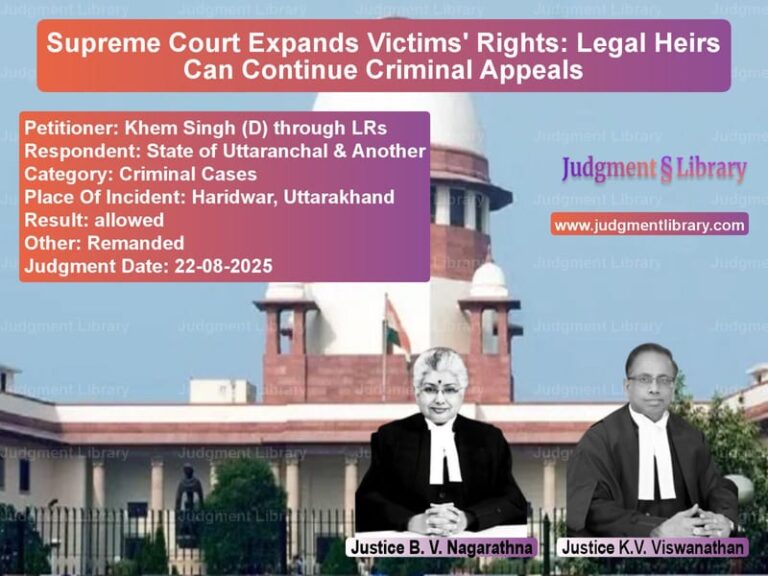Supreme Court Revives Fraud Case Against KIA Parts Manufacturer’s CFO
The Supreme Court of India recently delivered a significant judgment in the case of Hyeoksoo Son (Daechang Seat Automotive) v. Moon June Seok & Anr., setting aside the Karnataka High Court’s order that had quashed criminal proceedings against a Chief Financial Officer accused in a ₹10.18 crore financial fraud case. The apex court’s decision revives the criminal case and provides important clarifications on when High Courts can exercise their inherent powers to quash criminal proceedings.
Background of the Case
The case involves alleged financial irregularities in Daechang Seat Automotive Pvt. Ltd., a company manufacturing seat components for KIA vehicles. The company had engaged M/s N.K. Associates as chartered accountants and financial advisors. According to the complaint, the advisors falsely claimed the company had wrongly availed input tax credit of ₹9.73 crore and persuaded the company to transfer ₹10.18 crore to their accounts for purported GST payments, which were never made to the tax department.
An FIR was registered in December 2022 at Sanjay Nagar Police Station, Bengaluru, alleging offenses under Sections 406, 408, 409, 418, 420, and 120B read with 34 of the Indian Penal Code. The chargesheet named Moon June Seok (respondent No. 1) as accused No. 5, alleging his involvement as the company’s CFO.
High Court’s Decision
The Karnataka High Court, in its impugned judgment, had quashed the proceedings against Moon June Seok, observing:
“There is no prima facie material placed on record for framing charge against the petitioner-accused No.5… He was only forwarding agent working on behalf of the company… There is no role to play by this petitioner, except forwarding the bills to the Managing Director.”
Supreme Court Proceedings
Appellant’s Arguments
Senior Counsel Mr. Siddharth Luthra, appearing for Daechang Seat Automotive, made several key submissions:
- The High Court improperly conducted a mini-trial at the quashing stage, contrary to established principles in Neeharika Infrastructure Pvt. Ltd. v. State of Maharashtra.
- The respondent’s own statement acknowledged receiving ₹1.8 crore from co-accused Nikhil Kumar Singh in identical installments.
- As CFO, the respondent had control over company finances and was instrumental in bringing the other accused into financial operations.
- The High Court erroneously recorded the bribe amount as ₹1.8 lakh instead of ₹1.8 crore.
Respondent’s Defense
Senior Counsel Mr. Rajiv Shakdher countered these arguments:
- There was no direct evidence against the respondent, who served only in an administrative capacity due to language barriers.
- Section 409 IPC (criminal breach of trust) didn’t apply as the respondent wasn’t a public servant or entrusted with property.
- Reliance solely on co-accused statements is impermissible per CBI v. V.C. Shukla.
- An 8-month delay in FIR registration cast doubt on allegations.
Supreme Court’s Analysis
Justices Sanjay Karol and Ahsanuddin Amanullah analyzed the case through the lens of established principles for quashing criminal proceedings, as laid down in State of Haryana v. Bhajan Lal. The Court observed:
“When his own statement acknowledges the possibility that he had received money from accused No.1, which the latter has also alluded to, there prima facie appears to be a connection… Well, let it be proven in a trial that there is no evidence against Respondent No.1… At this stage, we are unable to convince ourselves that coming to such a conclusion would be just, reasonable, and proper, more so, keeping in view the large amounts of money involved.”
The Court noted several suspicious circumstances:
- Identical amounts (₹1 crore in May 2022 and ₹80 lakh in June 2022) mentioned in both respondent’s and co-accused’s statements
- The respondent’s recommendation to appoint accused No. 2 as Accounts Manager
- Lack of formal documentation for financial arrangements
Court’s Decision
The Supreme Court allowed the appeal with the following directions:
- Set aside the Karnataka High Court’s judgment quashing proceedings
- Restored Criminal Case No. 8373 of 2023 before III Additional Chief Metropolitan Magistrate, Bengaluru
- Directed parties to appear before trial court on April 16, 2025
Key Legal Principles Reaffirmed
The judgment reinforces several important legal principles:
- High Courts must exercise inherent powers under Section 482 CrPC sparingly and only in exceptional circumstances as outlined in Bhajan Lal.
- Courts shouldn’t conduct mini-trials at the quashing stage – allegations must be taken at face value for prima facie determination.
- Statements of co-accused can provide corroborative evidence when supported by other material.
- The rule of law must protect both foreign investors and the rights of the accused through proper trial processes.
This decision serves as an important reminder of the judiciary’s role in balancing the interests of businesses (especially foreign investors) and ensuring fair criminal proceedings.
Petitioner Name: Hyeoksoo Son (Daechang Seat Automotive Pvt. Ltd.).Respondent Name: Moon June Seok & Anr..Judgment By: Justice Sanjay Karol, Justice Ahsanuddin Amanullah.Place Of Incident: Bengaluru, Karnataka.Judgment Date: 08-04-2025.Result: allowed.
Don’t miss out on the full details! Download the complete judgment in PDF format below and gain valuable insights instantly!
Download Judgment: hyeoksoo-son-(daecha-vs-moon-june-seok-&-anr-supreme-court-of-india-judgment-dated-08-04-2025.pdf
Directly Download Judgment: Directly download this Judgment
See all petitions in Fraud and Forgery
See all petitions in Money Laundering Cases
See all petitions in Corporate Governance
See all petitions in Company Law
See all petitions in Judgment by Sanjay Karol
See all petitions in Judgment by Ahsanuddin Amanullah
See all petitions in allowed
See all petitions in supreme court of India judgments April 2025
See all petitions in 2025 judgments
See all posts in Criminal Cases Category
See all allowed petitions in Criminal Cases Category
See all Dismissed petitions in Criminal Cases Category
See all partially allowed petitions in Criminal Cases Category







